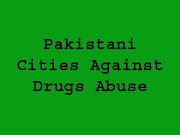
Cannabis — a fast emerging health problem in Pakistan
Friday, June 27, 2008Muhammad Qasim
IslamabadIn Pakistan, the youth comprises more than 20 per cent of the population but unfortunately it is the worst target of drug abuse, as almost five per cent of adult population in the country uses drugs.Head of Community Medicine at Islamabad Medical & Dental College, Colonel (r) Professor Dr Muhammad Ashraf Chaudhry expressed this while talking to ‘The News’ Thursday in connection with International Day against Drug Abuse and Illicit Trafficking, which is being observed on June 26.This year’s slogan of the United Nations Office on Drugs and Crime (UNODC) anti-drugs campaign is ‘Do drugs control your life, your community? No place for drugs.’ The number of drug addicts in Pakistan was about 5 million in 2005 that has been growing at an annual rate of 7 per cent. About 60 per cent drug addicts belong to educated class and most of them are college or university students. “According to estimates, one out of every ten college/university students is addict and over 50 per cent of them are living in a high risk drug abuse environment,” said Dr Ashraf. He said that drug abuse especially cannabis (marijuana, hashish, ganja, charas etc) is rapidly increasing in Pakistan especially among youth in colleges and universities, thereby resulting in serious health and social implications. “Drugs destroy lives and communities, undermine sustainable development and generate crime. Drug abuse affects freedom and development of young people, the world’s most valuable asset.” Dr Ashraf said that more and more youngsters are falling prey to cannabis in Pakistan. The irony is that there are many misconceptions about the use of cannabis among youth. “Most of them think that cannabis is a harmless drug, and it does not cause dependence whereas in actual, cannabis is harmful drug, it causes dependence and its occasional use even can cause complications and reactions.” Talking of the adverse affects of the substance, he said the most common adverse effect to cannabis is anxiety (restlessness, feelings of loss of control, panic, fear of impending death), depression, suicidal thoughts and psychosis. There is evidence that cannabis can cause acute schizophrenic psychosis leading to risk of developing schizophrenia in later life. “Around 10 per cent cases of schizophrenia could be attributed to cannabis,” he said and added that young and adolescent users might involve in delinquency and crime. To a query, he said that exposing brain to the substances such as cannabis at an early age could have negative effects on personal growth and development. All cannabinoids — are extremely fatty in nature and stay in the body including the brain for a prolonged period of time. “Cannabis smoke contains 50 per cent more tar than smoke of a high-tar cigarette, so regular use of cannabis increases the risk of lung cancer and chronic bronchitis.” He maintained that using cannabis leads to some problems what is called a ‘psychomotor’ function that is the ability to coordinate our actions. This is especially important when you are doing things like driving, operating machinery etc. Cannabis impairs memory, judgement, forward thinking.He said that parents can easily recognise their children who use cannabis or marijuana due to their typical signs and symptoms, behaviour change and spending more time in the bathrooms of their houses. “Moreover, cannabinoid metabolites can be detected in urine in case of doubt.” Talking on remedies of the problem, Dr Ashraf said that there is a need of taking the cannabis problem very seriously in Pakistan. “Parents, teachers, government and public health agencies should be alert to this rising epidemic of cannabis abuse among the Pakistani youth,” he said adding efforts should be made to control smoking tobacco in the country because it is gateway to cannabis use.







No comments:
Post a Comment